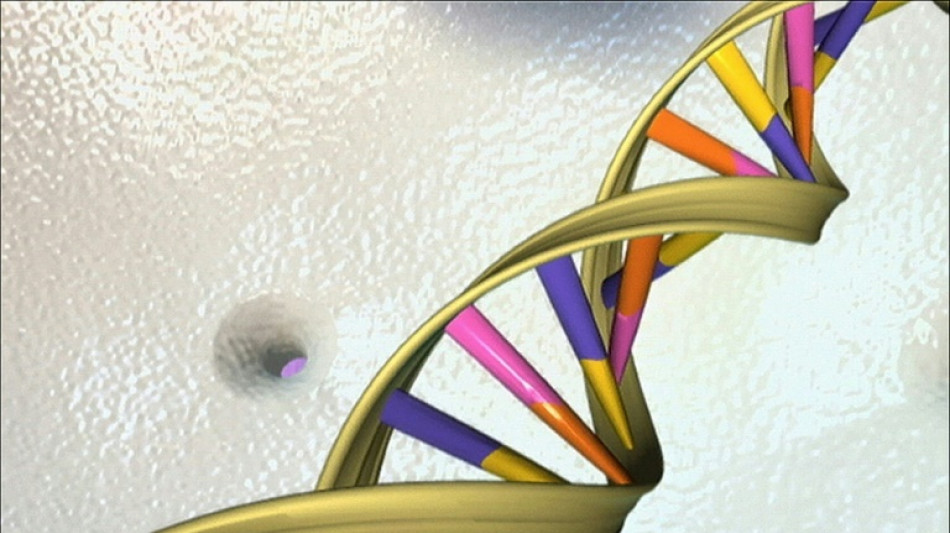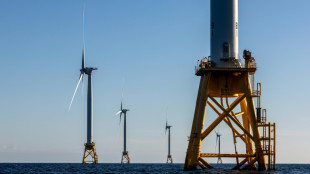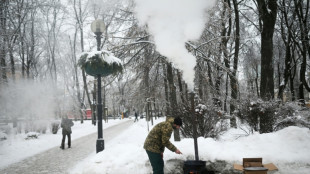
-
 Bills battle Broncos as Allen eyes Super Bowl
Bills battle Broncos as Allen eyes Super Bowl
-
Magic rally to top Grizzlies in NBA Berlin game

-
 Venezuela's Machado says she 'presented' Trump with Nobel medal
Venezuela's Machado says she 'presented' Trump with Nobel medal
-
Key Colombia guerrilla group backs pact to fight US, commander tells AFP

-
 Chiefs' Mahomes targets NFL 'Week 1' after knee surgery
Chiefs' Mahomes targets NFL 'Week 1' after knee surgery
-
Venezuelan interim leader vows oil sector reform after Maduro ouster

-
 Social media sites block 4.7 million underage accounts in Australia
Social media sites block 4.7 million underage accounts in Australia
-
US court clears Norway's Equinor to resume wind project halted by Trump

-
 Threats to Iran spike 'volatility': UN official
Threats to Iran spike 'volatility': UN official
-
Rabiot and AC Milan give Como French lesson to stay on Inter's heels

-
 US says reached deal with Taiwan to lower tariffs, boost investments
US says reached deal with Taiwan to lower tariffs, boost investments
-
South Korea's ex-leader Yoon faces first court verdict over martial law chaos

-
 'Gigantic explosion', fire in Dutch city of Utrecht, four hurt
'Gigantic explosion', fire in Dutch city of Utrecht, four hurt
-
Twenty-six charged in latest basketball gambling scandal

-
 Venezuela's Machado meets Trump for 'positive' talks despite snub
Venezuela's Machado meets Trump for 'positive' talks despite snub
-
NBA Europe 'must respect tradition', says commissioner Silver

-
 Thieves steal Pokemon cards in armed robbery at US store
Thieves steal Pokemon cards in armed robbery at US store
-
French Olympic champion Papadakis claims she was under partner's 'control'

-
 Fury over Grok sexualized images despite new restrictions
Fury over Grok sexualized images despite new restrictions
-
US says Iran halts executions as Gulf allies pull Trump back from strike

-
 Frank says Spurs taking 'small steps' in right direction
Frank says Spurs taking 'small steps' in right direction
-
Syrian activist Sarah Mardini acquitted of migrant trafficking in Greece

-
 Goldman Sachs' profits jump on hot merger market
Goldman Sachs' profits jump on hot merger market
-
Platini says Infantino has become 'more of an autocrat'

-
 Scottish Borders, Lake District to grace 2027 Tour de France
Scottish Borders, Lake District to grace 2027 Tour de France
-
Venezuela's sidelined Machado arrives at White House for Trump talks

-
 French mother superior bullied nuns at Paris order: inquiry
French mother superior bullied nuns at Paris order: inquiry
-
Cuba pays tribute to soldiers killed in Maduro capture

-
 UK politician joins hard-right Reform just hours after Tories sack him
UK politician joins hard-right Reform just hours after Tories sack him
-
'Gigantic explosion', fire in Dutch city, four hurt

-
 French mother superior bullied nuns at Paris convent - inquiry
French mother superior bullied nuns at Paris convent - inquiry
-
Deprived of heating, Kyiv enters survival mode to beat big freeze

-
 Oil prices slump after Trump eases concerns over Iran
Oil prices slump after Trump eases concerns over Iran
-
French mother superior bullied nuns in Montmartre: report

-
 Rosenior refuses to back Sanchez as Chelsea number one
Rosenior refuses to back Sanchez as Chelsea number one
-
Harry due to testify to UK court next week in last tabloid case

-
 Trump threatens to invoke Insurrection Act over Minnesota protests
Trump threatens to invoke Insurrection Act over Minnesota protests
-
Niger faces dilemma over uranium shipment stuck at airport

-
 UN chief attacks world leaders putting cooperation on 'deathwatch'
UN chief attacks world leaders putting cooperation on 'deathwatch'
-
Morocco and Senegal prepare for final showdown but Salah's AFCON dream fades

-
 Polls close in Uganda after delays, internet blackout
Polls close in Uganda after delays, internet blackout
-
Forced confession fears as Iran chief justice interrogates protesters

-
 Al-Attiyah closes on sixth Dakar Rally as Ekstrom wins 11th stage
Al-Attiyah closes on sixth Dakar Rally as Ekstrom wins 11th stage
-
Luis Enrique has no doubts about PSG's title credentials

-
 England off-spinner Bashir signs for Derbyshire after Ashes exile
England off-spinner Bashir signs for Derbyshire after Ashes exile
-
Trump convinced 'to give Iran a chance' after threats over protest crackdown

-
 European military mission in Greenland as US aim 'remains intact'
European military mission in Greenland as US aim 'remains intact'
-
UK's Hockney warns moving Bayeux Tapestry would be 'madness'

-
 Senior UK opposition politican sacked over 'plot' to join hard-right party
Senior UK opposition politican sacked over 'plot' to join hard-right party
-
Syrians flee Kurdish-controlled area near Aleppo


Google AI tool predicts danger of genetic mutations
Researchers at Google DeepMind, the tech giant's artificial intelligence arm, on Tuesday introduced a tool that predicts whether genetic mutations are likely to cause harm, a breakthrough that could help research into rare diseases.
The findings are "another step in recognising the impact that AI is having in the natural sciences," said Pushmeet Kohli, vice president for research at Google DeepMind.
The tool focuses on so-called "missense" mutations, where a single letter of the genetic code is affected.
A typical human has 9,000 such mutations throughout their genome; they can be harmless or cause diseases such as cystic fibrosis or cancer, or damage brain development.
To date, four million of these mutations have been observed in humans, but only two percent of them have been classified, either as disease-causing or benign.
In all, there are 71 million such possible mutations. The Google DeepMind tool, called AlphaMissense, reviewed these mutations and was able to predict 89 percent of them, with 90 percent accuracy.
A score was assigned to each mutation, indicating the risk of it causing disease (otherwise referred to as pathogenic).
The result: 57 percent were classified as probably benign, and 32 percent as probably pathogenic -- the remainder being uncertain.
The database was made public and available to scientists, and an accompanying study was published on Tuesday in the journal Science.
AlphaMissense demonstrates "superior performance" than previously available tools, wrote experts Joseph Marsh and Sarah Teichmann in an article also published in Science.
"We should emphasize that the predictions were never really trained or never really intended to be used for clinical diagnosis alone," said Jun Cheng of Google DeepMind.
"However, we do think that our predictions can potentially be helpful to increase the diagnosed rate of rare disease, and also potentially to help us find new disease-causing genes," Cheng added.
Indirectly, this could lead to the development of new treatments, the researchers said.
The tool was trained on the DNA of humans and closely-related primates, enabling it to recognize which genetic mutations are widespread.
Cheng said the training allowed the tool to input "millions of protein sequences and learns what a regular protein sequence looks like."
It then could identify a mutation and its potential for harm.
Cheng compared the process to learning a language.
"If we substitute a word from an English sentence, a person that is familiar with English can immediately see whether this word substitution will change the meaning of the sentence or not."
F.AbuShamala--SF-PST




